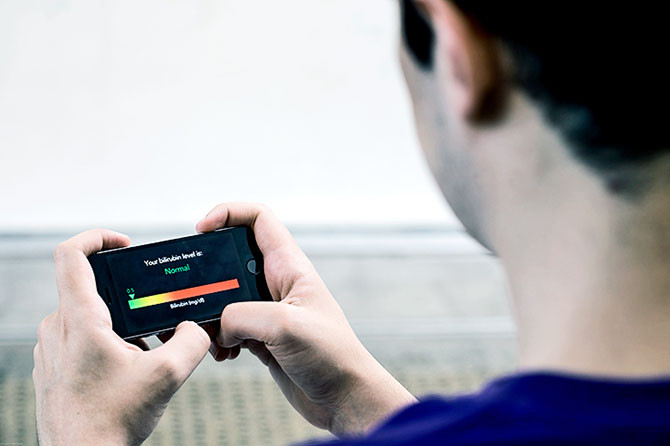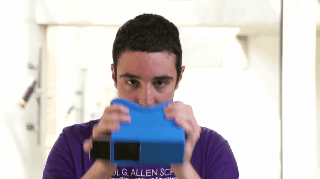Detection of pancreatic cancer by taking selfie pictures
A newly launched mobile app can help people easily find out if they have pancreatic cancer and some other diseases just by taking a selfie photo!
Pancreatic cancer is one of the most dangerous cancers in the world, only about 9% of people recover after 5 years of fighting with cancer. The reason is because it is a disease that has no obvious symptoms and no tools to find the tumor before it spreads.

This application is called BiliScreen.
One of the early symptoms of pancreatic cancer and many other diseases is jaundice - the skin and eyes turn yellow - caused by the accumulation of bilirubin (a type of orange pigment - yellow formed in the liver due to the breakdown of hemoglobin and excretion in bile) in the blood. However, "a major problem with pancreatic cancer is when you have symptoms that are too late, " said graduate student Alex Mariakakis at the Paul G. Allen School of Engineering and Computer Science. The University of Washington, co-author of the software, said.
This application is called BiliScreen . The application uses cameras on smartphones, along with computer vision processing algorithms and machine learning tools to detect the level of bilirubin increases in the white part of the human eye. BiliScreen will analyze the human eye in selfie photos, separate the white part of the eye and then analyze the color information in this area based on the wavelengths of absorbed and reflected light, then draw the information. About the amount of bilirubin based on machine learning algorithm.

BiliScreen will analyze human eyes in selfie photos.
The team also tried BiliScreen with two accessories: a glass with a square border of color boxes to help with color calibration, and a 3D printed box to prevent too much light from entering the eyes. The results show that when used with a 3D printed box gives a slightly more accurate result.
Specifically, during a trial of more than 70 volunteers who participated, BiliScreen detected the correct number of potential cases up to 89.7% when compared to blood tests.
Blood tests to measure bilirubin are usually not performed on adults unless there is a special reason, and also cause difficulties in regular monitoring.
Fix this drawback, BiliScreen is designed to be very easy to use, and the results it offers can help you know whether to go to a doctor for a closer examination. Besides diagnosis, it also helps pancreatic cancer patients reduce the burden of regularly monitoring the amount of bilirubin."We hope people can do this simple test once a month, right at their home, so that they can soon detect the disease and heal quickly."

BiliScreen with two accessories: a glass with a square border of colored boxes to help colorize.
In adults, the eyes are much more sensitive than the skin when the amount of bilirubin changes (the initial sign of many diseases such as pancreatic cancer, hepatitis, or Gilbert's symptoms). Unlike skin color, changes in eye whites are more easily recognizable even when you are black, yellow, white, or of any race.
Of course, when people begin to notice a yellowish-white sign of obvious eye whiteness, the amount of bilirubin exceeds the remarkable level; so researchers are now looking for ways to boost machine learning tools that can detect discoloration in the eye before people can even see for themselves.
BiliScreen is written based on the source code of Ubiquitous Computing Lab - a laboratory that previously developed the BiliCam phone application to detect neonatal jaundice through baby photography. It is known that BiliCam has accurately detected up to 530 infant cases.
This application will be officially introduced on September 13 here in Ubicomp 2017. The application is sponsored by the National Science Association of America, Coulter Foundation and Washington Research Foundation.
- Research affirms: The more pictures taken by women, the more selfie they will be!
- New method of early diagnosis of pancreatic cancer
- Early detection of pancreatic cancer symptoms will help the cure rate higher
- Find out the 'father' of the selfie stick invention
- Benefits of selfie
- Decoding the gene sequence of pancreatic cancer
- Early detection of pancreatic cancer and bile cancer
- Signs of risk of pancreatic cancer
- The most adventurous selfie in the world
- Taking a lot of selfie can cause Selfitis, let's find out about it
- Detection of proteins related to pancreatic cancer
- New hope for people with pancreatic cancer
 Why is Australia the country with the highest cancer rate in the world while Vietnam ranks 100th?
Why is Australia the country with the highest cancer rate in the world while Vietnam ranks 100th? New drug causes cancer to 'starve'
New drug causes cancer to 'starve' Common cancers in men
Common cancers in men America's incredible discovery: The most feared cancer cell is love
America's incredible discovery: The most feared cancer cell is love The magic drug can halve the risk of cancer death
The magic drug can halve the risk of cancer death  New nanoscale machines can kill cancer cells in minutes
New nanoscale machines can kill cancer cells in minutes  101-year-old grandfather winning cancer became a miracle of medicine
101-year-old grandfather winning cancer became a miracle of medicine  Pain reliever Aspirin - a double-edged sword for cancer prevention
Pain reliever Aspirin - a double-edged sword for cancer prevention  Nanoparticles kill cancer cells by ... punching
Nanoparticles kill cancer cells by ... punching  Zika virus kills brain cancer cells
Zika virus kills brain cancer cells 